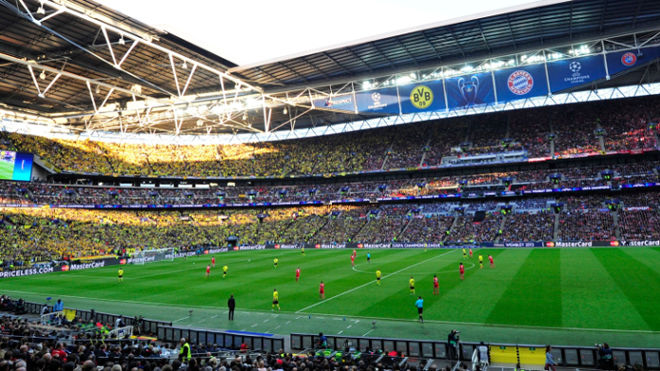The Legacy Of Wembley Stadium: Home To Iconic Football Moments
Wembley Stadium stands as a colossus in the world of football, a venue steeped in history, tradition, and a legacy of unforgettable moments.
Located in London, England, Wembley has been the epicenter of English football since its inception, hosting some of the sport’s most iconic matches and events that have captivated millions around the globe.
From historic cup finals to international showdowns, Wembley’s rich tapestry continues to weave the story of football’s triumphs, heartaches, and enduring magic.
A Storied History
The origins of Wembley Stadium trace back to 1923 when it was built for the British Empire Exhibition. Little did anyone know then that it would become the spiritual home of English football.
The twin towers, which adorned the stadium until their demolition in 2003, became an iconic symbol of Wembley’s stature in the footballing world.
From the very first FA Cup Final held at Wembley in 1923, where Bolton Wanderers defeated West Ham United, the stadium cemented its place as the venue for English football’s most prestigious fixture.
The 1966 World Cup Final
No recounting of Wembley’s legacy is complete without mentioning the 1966 FIFA World Cup Final. On July 30th, 1966, a sunlit Wembley Stadium witnessed England and West Germany clash in a match that would forever change football history.
Geoff Hurst’s iconic hat trick, including the controversial “Was it over the line?” goal, propelled England to a 4-2 victory after extra time, securing their first and only World Cup triumph to date.
The celebrations that followed, with Bobby Moore lifting the Jules Rimet Trophy, are etched into the memories of football fans worldwide, solidifying Wembley’s place as a hallowed ground of sporting achievement.
The Modern Era: New Wembley
After decades of hosting historic matches, the original Wembley Stadium saw its last game in 2000 before being demolished to make way for the new Wembley. Officially opened in 2007, the new stadium retained the iconic twin towers in the form of the stadium’s entrance arch, which has become a symbol of modern Wembley.
With a capacity of over 90,000 spectators, a state-of-the-art retractable roof, and world-class facilities, the new Wembley Stadium continues to uphold its legacy while embracing the demands of modern sport and entertainment.
Iconic Football Events at New Wembley
Since its reopening, Wembley Stadium has hosted many memorable football events that have further cemented its status as one of the world’s premier sporting venues. The FA Cup Final, a perennial highlight of the English football calendar, returned to Wembley in 2007, with Chelsea defeating Manchester United in the first final at the new stadium.
The subsequent years have seen dramatic finals, including Manchester City’s historic domestic treble-clinching victory in 2019 and Arsenal’s 14th FA Cup triumph in 2020.
International football has also found a home at Wembley, hosting England’s national team for crucial UEFA European Championship and FIFA World Cup qualifying matches.
Memorable encounters include England’s dramatic 2-1 victory over Croatia in 2007, which secured qualification for the 2008 UEFA Euro, and the pulsating 4-2 victory over Croatia in 2021, which saw England qualify for the UEFA Euro 2020 knockout stages in front of a jubilant home crowd.
European Club Finals
Wembley Stadium has not only been the stage for domestic and international matches but has also hosted several prestigious European club finals.
The UEFA Champions League final returned to Wembley in 2011, where Barcelona defeated Manchester United 3-1 in a match remembered for Lionel Messi’s brilliance.
The UEFA Europa League final has also graced Wembley’s turf, with Chelsea and Manchester United both lifting the trophy at the iconic stadium.
Beyond Football: Wembley’s Versatility
Wembley Stadium’s versatility extends beyond football, playing host to a wide array of events that showcase its cultural significance and impact.
The stadium has been a venue for concerts featuring global superstars such as Adele, Beyoncé, and Ed Sheeran, attracting millions of music fans to its hallowed grounds.
It has also hosted major events such as the 1948 Summer Olympics, the 2012 London Olympics football tournament, and NFL London Games, further solidifying its reputation as a global sporting and entertainment destination.
Wembley: A Cultural Landmark
Beyond its architectural grandeur and technological advancements, Wembley Stadium holds a special place in the hearts of millions worldwide. It represents more than just a venue for sporting events; it is a cultural landmark where dreams are realized, and legends are made.
From Bobby Moore and Geoff Hurst to Lionel Messi and Cristiano Ronaldo, Wembley has witnessed the feats of football’s greatest stars, each leaving their indelible mark on the stadium’s storied history.
Conclusion
In conclusion, Wembley Stadium stands as a testament to the enduring power of sport to inspire, unite, and captivate.
From its humble beginnings in 1923 to its current status as a global icon of footballing excellence, Wembley has transcended its physical structure to become a symbol of hope, passion, and achievement.
As long as football continues to captivate the hearts and minds of fans worldwide, Wembley Stadium will remain a sacred ground where history is made and the spirit of the game lives on.
Whether hosting a historic cup final, a thrilling international showdown, or a mesmerizing concert under its iconic arch, Wembley Stadium continues to add new chapters to its illustrious legacy.
It remains a beacon of sporting greatness, a shrine to football’s past, present, and future, and a place where the world gathers to witness the magic of the beautiful game unfold.







